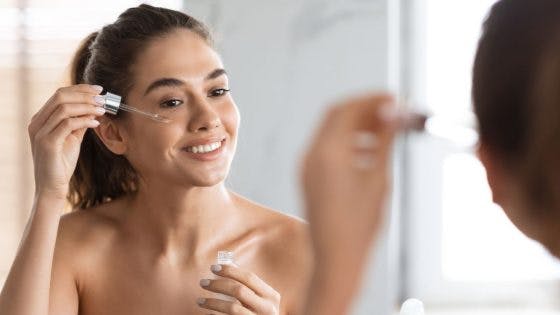Retinol Serums: Which Are The Best & How Do You Use Them?
11 minutes read
Retinol serum… two words that are a heaven-made match when it comes to skin routines. Retinol is the gold-standard active ingredient that takes on everything from fine lines and wrinkles, textured skin, sun damage and hyperpigmentation, and acne, oversized pores or oily. Couple this with a serum formulation, and you have one of the most potent pro-ageing tools at your fingertips. Serums tend to be the most concentrated formulations – meaning they work harder and provide faster results.
Let’s find out how retinol works, its skin benefits, and which is the best retinol serum — or retinol alternative — for you.
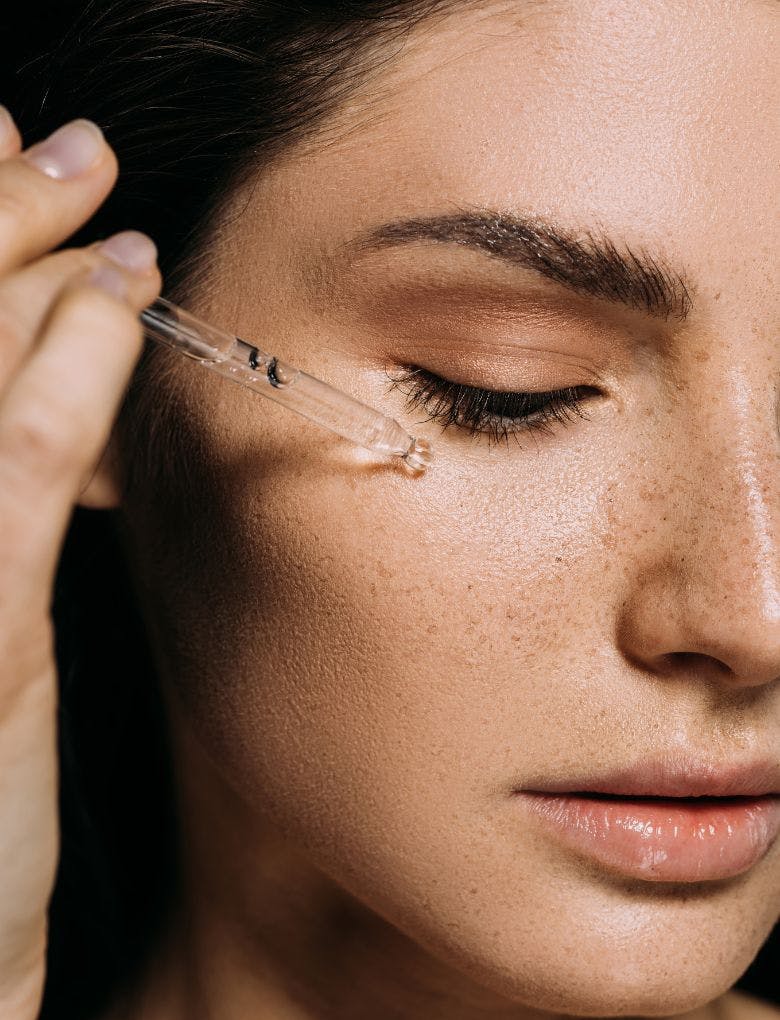
What does retinol serum do for the skin?
Retinol is the alcohol form of vitamin A (it and its derivatives are known collectively as retinoids). Its multiple skin benefits have been known for many decades, and vitamin A was the first vitamin approved for anti-wrinkle and anti-ageing effects by governing bodies.
Vitamin A penetrates the skin even into the dermis, the skin’s ‘living’ layer.
There are various forms of retinoids, including retinaldehyde and retinyl palmitate, but retinol is the most popular over-the-counter use because it is less irritating.
Once inside the body, retinol and the other forms of vitamin A are all ultimately converted into the most potent form — retinoic acid. Retinol and retinaldehyde (aka retinal) are available OTC. Still, retinoic acid (you may know the brand Retin-A) is only available on prescription because of its strength and potential side effects.
In the skin, retinol has several impressive and important functions:
- It regulates skin cells’ function and helps repair damaged cells. It also reduces water loss from the skin and improves blood flow.
- Collagen production is boosted, which enhances skin firmness, plumpness, and strength.
- It prevents collagen and elastin breakdown, helping to smooth wrinkles, fine lines, and sagging skin.
- Improved skin cell cellular turnover leads to smoother and more radiant-looking skin. In addition, it helps create an even skin tone, fades hyperpigmentation (brown marks and patches), and gives the complexion a more uniform appearance.
- By normalising overactive oil glands, retinol aids in the treatment of acne. And its exfoliating properties help to unclog pores, preventing and clearing blackheads, whiteheads, pimples, and cystic acne, refining pores and promoting a more even texture.
- It also helps fade post-inflammatory hyperpigmentation and improve acne scarring.
- In addition, its antioxidant properties help to reverse the effects of sun damage.
When choosing a retinol serum, know that these beauty specialists pack supercharged bang for your buck. The premium price tag on many serums is often due to their inclusion of the highest concentration of the most expensive active ingredients. In addition, they are designed with targeted actions to treat specific skin concerns quickly and efficiently.
When should you start using retinol?
Skin experts recommend using retinol in your teens if you have oily or acne-prone skin. Generally, you can use it in your late 20s or 30s to maximise its effects against environmental ageing.
Are there any side effects to retinol?
The downside of retinol is that it can cause skin irritation, redness and dryness because of its intensive actions, which is why it is recommended to start with the lowest dose of retinol (0.03%) and acclimatise the skin sloooowly, building up to 1%, as we explain below.
It’s normal to experience mild redness, irritation, tingling, flaking and dryness. This should stop in a few weeks once your skin has adapted.
It’s NOT normal to experience burning, stinging, heavy flakiness and redness. However, you should stop using it immediately and consult a dermatologist, as retinol may not suit you.
It’s also essential to understand that retinol can make your skin more sensitive to sunlight and, therefore, UV damage. So, wear SPF50 sunscreen daily when using retinol to minimise the risk of sun damage.
Who should NOT use retinol?
While most consider retinol safe, it might not suit everyone.
Don’t use any form of retinoid if you’re pregnant (or planning to be) or breastfeeding. Large doses of vitamin A can cause congenital disabilities in the baby, and there is only limited research on the safety of retinol while breastfeeding.
Instead, use retinol alternatives or other pregnancy-safe ingredients such as antioxidants, vitamin C, niacinamide, glycolic and lactic acid.
If your skin is very sensitive, you have rosacea, psoriasis or eczema, best to avoid using it unless you’re following an expert-led treatment plan. If you get the go-ahead, do a patch test first on the inside of your elbow and see how your skin reacts for 24 hours.
Piling retinol on top could make it even more uncomfortable when using other highly active treatments that irritate or dry the skin, like benzoyl peroxide or alpha-hydroxy acids. So speak to a skincare professional or dermatologist before using retinol with these treatments.
Retinol can irritate your skin if you’re sunburnt or have an open wound. Skip the retinol until your skin is fully healed.
Best retinol alternatives
When retinol’s not an option for you, it’s good to know that excellent retinol alternatives offer similar results without irritation.
The plant-based active harungana, used by Clarins in their Super Restorative range, works 40% more effectively than retinol, helping skin cells regenerate and accelerating their turnover. It can be used safely while pregnant and feels lovely to use (some retinol products can be a bit claggy – and are hard to apply, like a zinc-y SPF.)
Bakuchiol, another active plant ingredient, is another gentle, non-irritating retinol alternative.
How do you use a retinol serum to prevent skin irritation?
For best, non-irritating results with retinol, it’s important to adopt a slow-and-steady approach:
- Begin with a low-percentage retinol dose (0.03%) and gradually increase the retinol concentration over several months. Always follow the usage instructions.
- Always apply retinol at night, as it can increase the skin’s sensitivity to sunlight. And cleanse your face gently in the morning to remove any residue.
- Gradually increase how often you use retinol each week, starting with once or twice a week, then three times, and so on. Then, if you notice redness or irritation, skip that night’s application. Over eight weeks, work your way up to using retinol every night. However, if your skin reacts badly, you should stop using it immediately and give your skin a break.
- Before applying retinol, cleanse your skin with a gentle cleanser, and avoid using toners or scrubs (use those in the morning if your skin isn’t feeling irritated). Dry your skin thoroughly before applying retinol, as using it on damp skin can increase irritation due to the penetration factor of open pores and damp skin.
- Apply a pea-sized amount of retinol on your face and gently pat it in. Avoid getting the serum in your eyes. Then, use the same amount again to treat your chest and neck.
- Apply a gentle, soothing moisturiser on top to avoid dryness.
- If you’re prone to sensitivity, peeling or irritation, try the sandwich technique: First apply a hyaluronic-acid serum, followed by retinol, then use a soothing moisturiser, like hyaluronic acid-enriched Hydra-Essentiel [HA²] Night Cream, £40.
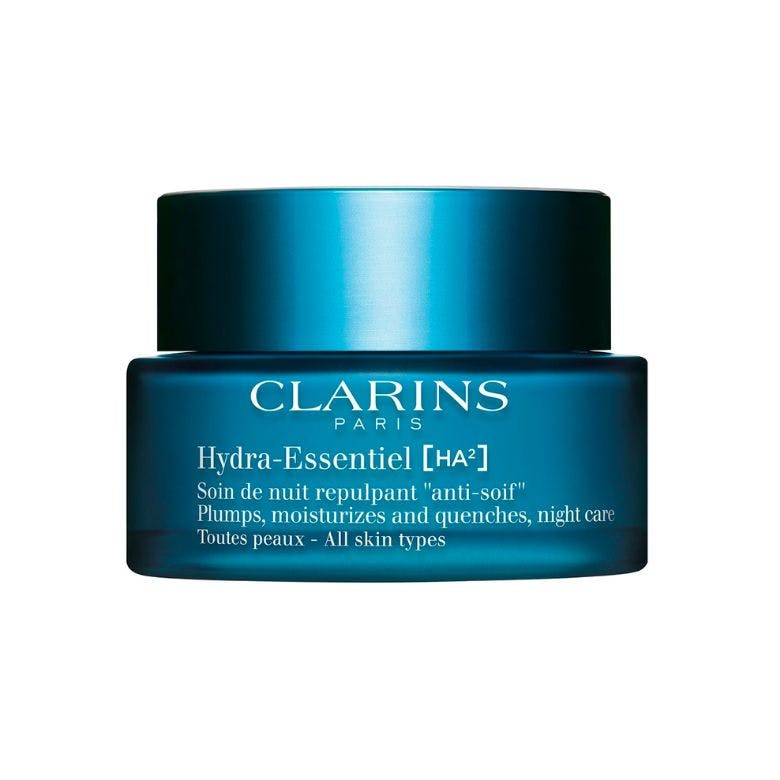
- When using a retinol product, wear sunscreen SPF 50 every day/365.
Can you combine retinol with other actives?
Combining retinol with certain ingredients can enhance their results, as well as buffering your skin against irritation and dryness. This includes hydrating ingredients such as hyaluronic acid, glycerine, ceramides and specific peptides.
Layering retinol and vitamin C skincare might be best avoided if you are new to these actives. This is because vitamin C and retinol can both be irritating, especially for first-time users. This also goes for other acids, such as AHA/BHA.
A workable solution is to opt for a vitamin C serum in the morning and retinol at night.
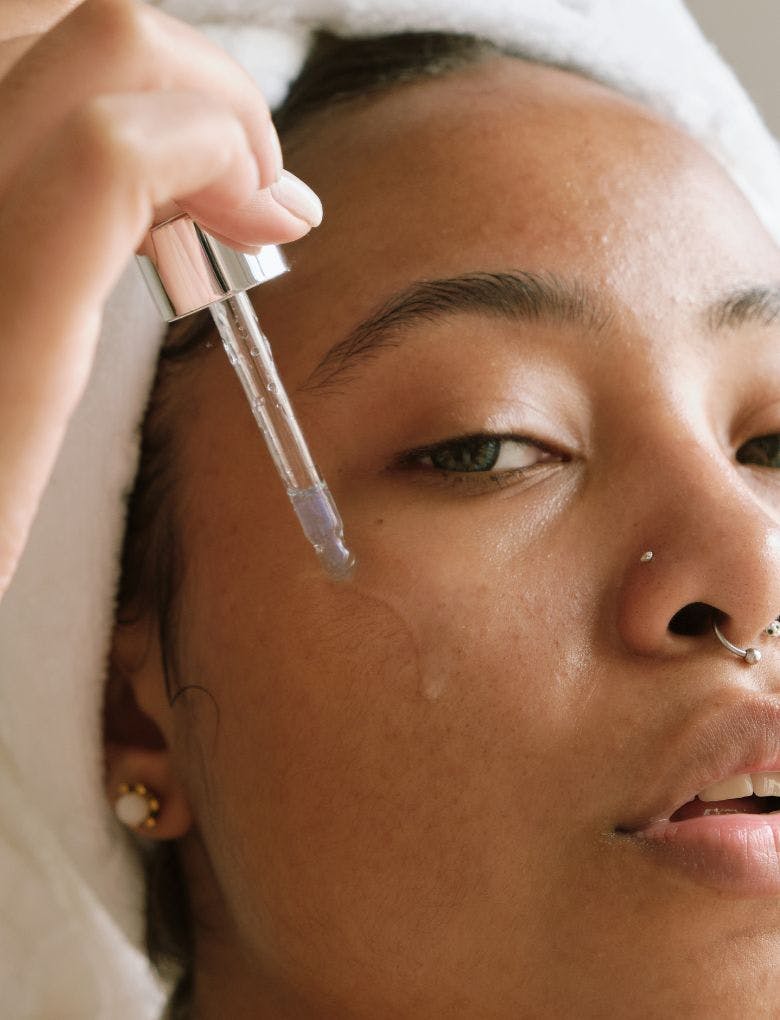
What strength retinol do you need?
It all depends on how your skin reacts to the retinol.
It would help if you gradually built up with low-dose retinol (0.03% to 0.5%). You’ll find OTC retinol in up to 2%, but most products contain about 1% retinol. Anything above that needs a prescription.
If you have sensitive skin, stick to lower concentrations, and look for formulations that combine it with soothing and hydrating ingredients.
With retinol, it’s a long game. With lower concentrations, it may take between a few weeks to a few months to start seeing results. Prescription retinol generally works faster. Remember, though, even products that contain only 0.01% have been shown to make a difference to skin.
Can I use retinol every day?
You need first to acclimatise the skin, but once it’s adapted, you can use it every day, depending on the concentration, and the formulation, so do your homework. For example, a retinol serum may be best used as an intensive treatment every few months, while a retinol night cream could be used daily.
However, taking breaks from retinol allows your skin to recover and helps minimise the risk of irritation or overexposure. Therefore, it’s generally recommended to take a break from retinol every few months or as advised by a dermatologist. During this break, you can temporarily substitute retinol with other gentle skincare products to maintain your skin’s health and hydration and ensure your skin barrier is as it should be.
How do you know if retinol is working?
It can take some time (about three months) to see results, and the effects may vary depending on your skin type and concerns. Some people have noticed a difference after a retinol mask – with skin smoothness, or a retinol serum after a week.
Signs that retinol may be working include smoother, brighter, more even-toned skin. Softened lines and wrinkles and firmer, more elastic skin. Dark marks and hyperpigmentation start to fade.
Our recommended retinol serums
Best retinol serum for beginners
Dr Dennis Gross Skincare Advanced Retinol and Ferulic Texture Renewal Serum, £76
It combines retinol with powerful anti-agers bakuchiol, ferulic acid, and hydrating hyaluronic acid and glycerine, while liquorice-root extract soothes inflammation. Suitable for all skin types.
Best retinol-alternative serum
Clarins Super Restorative Remodelling Serum, £113
Clarins’ multi-intensive anti-ageing treatment with harungana and Montpellier rock rose helps to fade wrinkles and reduce dark spots as it restores radiance and lifts and reshapes facial contours.
Best retinol serum for reactive skins
iS Clinical Pro-Heal Serum Advance+ 30ml £155.
This soothing, healing serum with exceptional antioxidant protection features time-released vitamin C and 1% retinol to stimulate collagen production, as well as olive leaf extract and vitamin E. It reduces redness and inflammation and might be a good choice for those with rosacea, acne, and contact dermatitis.
Best retinol serum for anti-ageing
Environ Youth EssentiA Vita-Peptide C-Quence Serum 1, £99.95 to Serum 4 Plus, £115.
This serum comes in 4 strengths (starting from 1 to full-strength 4, plus Serum 4 plus for maintenance). It contains vitamins A and C, peptides, essential vitamins and antioxidants. Suitable for all skin types, even those with sensitive skin can use it if they follow the right sequence.
Best retinol serum for hydration
Murad Retinol Youth Renewal Serum, £86
Three forms of retinol: a fast-acting retinoid, time-released retinol and a retinol booster work together to tackle uneven texture, excess oil and acne. Squalane and hyaluronic acid keep moisture levels topped up and help to soothe.
Best retinol serum for mature skin
Augustinus Bader The Retinol Serum £270 30ml
This cultish product is formulated with stabilised retinol, anti-inflammatory zinc and botanical extracts, and an anti-ageing marine ectoine, among other potent ingredients. It promises to ‘reduce the appearance of blemishes, pigmentation, hyperpigmentation, acne scars, and deep lines and wrinkles, whilst also working to protect your skin from premature ageing.’
Best retinol anti-ageing serum for blemish-prone skin
Perricone MD Blemish Relief Retinol Treatment & Moisturizer £47 59ml
Perfect for oily and blemish-prone skin, it pairs retinol, salicylic acid, niacinamide and citrulline to help prevent and eliminate breakouts as it controls excess oil (without drying the skin) and fights breakouts overnight. It leaves skin soothed and comfortable, with reduced shine.
Best retinol serum for eyes
The skin around the eye area is the thinnest and most delicate on the face, so it’s the first place to show fine lines and wrinkles, loss of radiance, and often there can be hyperpigmentation. But how do you use retinol on this most sensitive of areas? We dish the facts in Are Retinol Eye Creams Worth The Hype? The Experts Weigh In.
You can get all the benefits of retinol without the potential irritation with UK’s #1 eye treatment,* the iconic Clarins Total Eye Lift serum £62 15ml.
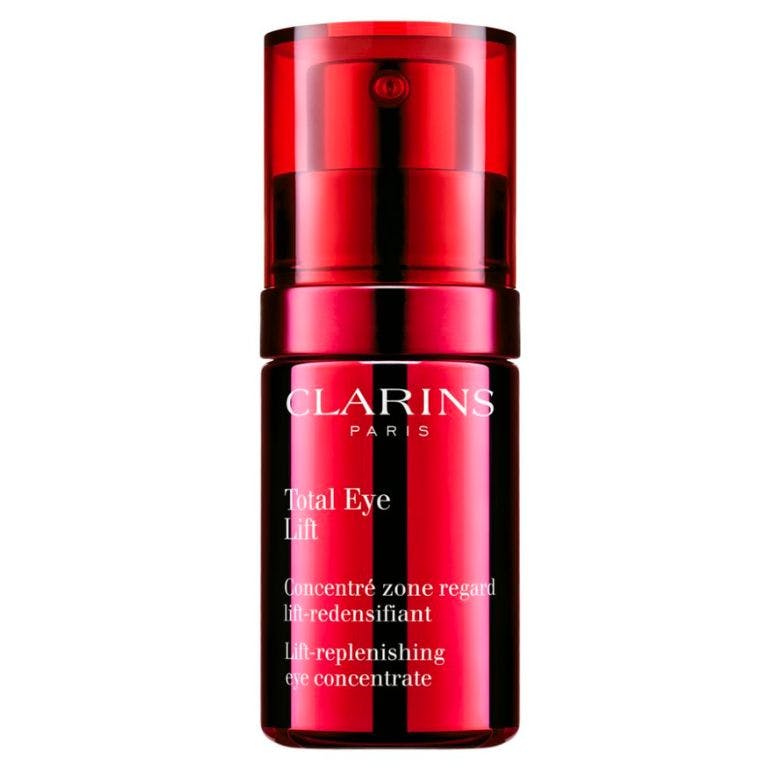
Harungana and albizia extract restore density, firmness and radiance as fine lines are smoothed, while horse chestnut and guarana tackle shadows and under-eye bags.
Exuviance Professional Retinol Eye Creme, £71.60 15ml, contains 0.05% time-released retinol, neoglucosamine, peptides and vitamin E. The skin-renewal action promises a smoother, firmer and brighter appearance as crepiness, wrinkles and dark shadows are targeted without irritation.
Retinol FAQs
Does using retinol really help with existing age lines?
Yes, using retinol can help to improve the appearance of existing lines or wrinkles over time by stimulating collagen production in the skin, as well as helping to improve the texture and tone of the skin, which also reduces the appearance of fine lines and wrinkles.
Can I use a retinol cream or serum during the day?
Retinol can cause sensitivity to sunlight, so it is generally recommended for nighttime use.
Will retinol thin my skin?
There’s no definitive evidence to support this claim. In fact, some research suggests that retinol helps to improve skin thickness.
Read next: Personalised skincare: the bespoke services that garner real results
Sign up for our newsletter
We will keep you in the loop for special offers, exclusive gifts and product news.

